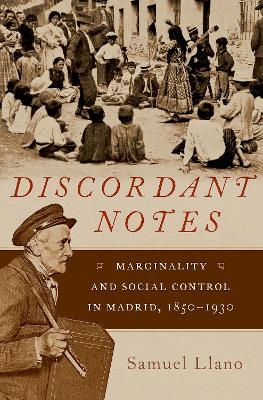
Discordant Notes
Oxford University Press Inc (Verlag)
978-0-19-939246-9 (ISBN)
Scholarship on urban culture and the senses has traditionally focused on the study of literature and the visual arts. Recent decades have seen a surge of interest on the effects of sound the urban space and its population. These studies analyse how sound generates identities that are often fragmentary and mutually conflicting. They also explore the ways in which sound triggers campaigns against the negative effects of noise on the nerves and health of the population. Little research has been carried out about the impact of sound and music in areas of broader social and political concern such as social aid, hygiene and social control. Based on a detailed study of Madrid from the 1850s to the 1930s, Discordant Notes argues that sound and music have played a key role in structuring the transition to modernity by helping to negotiate social attitudes and legal responses to problems such as poverty, insalubrity, and crime. Attempts to control the social groups that own unwanted musical practices such as organ grinding and flamenco performances in taverns raised awareness about public hygiene, alcoholism and crime, and triggered legal reform in these areas. In addition to scapegoating, marginalising and persecuting these musical practices, the authorities and the media used workhouse bands as instruments of social control to spread "aural hygiene" across the city.
Samuel Llano is a Lecturer (Assistant Professor) in Spanish Cultural Studies at the University of Manchester. He specialises in the music of nineteenth and twentieth century Spain, urban studies and transnationalism. His first book, Whose Spain?: Negotiating 'Spanish Music' in Paris, 1908-1929 (OUP, 2012) received the Robert M. Stevenson Award of the American Musicological Society for outstanding scholarship in Iberian and Latin American music.
List of Figures iii
Acknowledgements v
Introduction 1
Part I: Flamenquismo, Race and Social Disorder 16
Chapter 1: The Rise of flamenquismo in Madrid, 1888-1898 22
Chapter 2: Flamenquismo and Race 40
Chapter 3: Flamenco, Flamenquismo and Social Control 63
Chapter 4: Anti-Flamenquismo and Mass Entertainment: Eugenio Noel 90
Chapter 5: Madrid, Cante Jondo, and Nostalgia 106
Part II: Organ grinders, "Aural Hygiene" and Space 135
Chapter 6: A Public Nuisance 144
Chapter 7: Early Debates 165
Chapter 8: The Persecution of Organilleros 180
Chapter 9: A New Order? 192
Chapter 10: The Demise and Enshrining of Organilleros 214
Part III: Workhouse Bands, Confinement and Social Aid 227
Chapter 11: Confinement, Mendicancy, and the Making of the Street Musician 232
Chapter 12: Inside the Workhouse: A Soundtrack of Discipline 252
Chapter 13: Conquering the Public Space 270
Chapter 14: The Band and Social Disorder 286
Conclusion 304
Bibliography
| Erscheinungsdatum | 17.11.2018 |
|---|---|
| Reihe/Serie | Currents in Latin American and Iberian Music |
| Verlagsort | New York |
| Sprache | englisch |
| Maße | 239 x 160 mm |
| Gewicht | 499 g |
| Themenwelt | Kunst / Musik / Theater ► Musik ► Musiktheorie / Musiklehre |
| Geisteswissenschaften ► Geschichte ► Regional- / Ländergeschichte | |
| Geschichte ► Teilgebiete der Geschichte ► Kulturgeschichte | |
| ISBN-10 | 0-19-939246-3 / 0199392463 |
| ISBN-13 | 978-0-19-939246-9 / 9780199392469 |
| Zustand | Neuware |
| Informationen gemäß Produktsicherheitsverordnung (GPSR) | |
| Haben Sie eine Frage zum Produkt? |
aus dem Bereich


